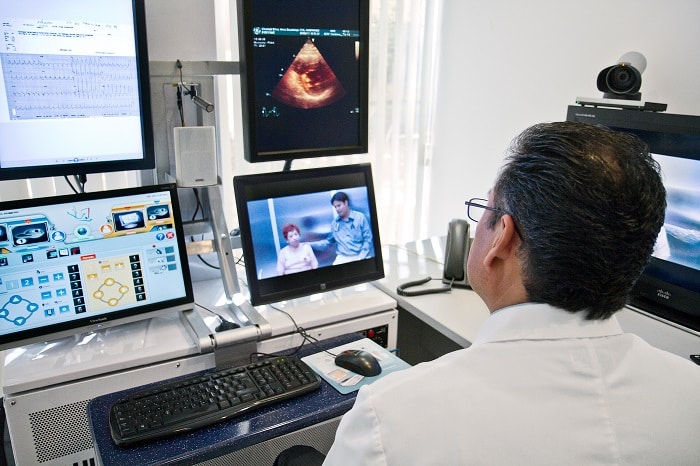Care service providers have had to drastically adapt to modern day technology over the past decade, as it is constantly evolving and impacting our lives, one way or another. Not only is it affecting businesses throughout the globe, it’s also had a huge impact on a number of healthcare services.
You may not be aware of this, but the breakthroughs in digital healthcare are making a huge difference to everyone’s life for the greater good. Healthcare experts are constantly coming up with new and innovative ideas to change and improve healthcare for future generations. However simple or sophisticated, there has been a truly remarkable change in the way we look at digital health tools and how they are changing the ways in which you interact with your healthcare team and carers.
How have digital advancements improved global healthcare?
The impact of technology on healthcare is simply staggering, although you may be assuming that we are referring to the equipment used in health centres.
Highly accurate data consumption
Online access to personal health information, such as lab results, current medications and other vital data, has helped health professionals to provide safe and effective care, which in turn allows healthcare professionals to track your care, ease your anxiety, and facilitate discussions and secure sharing with your family and home care services providers.
Improved communication
This aspect of healthcare is something that has been improved significantly in recent years. With medical records now available online, the likes of electronic prescriptions and requests for renewals have been upgraded in order to reduce the amount of manual errors, which may occur in this particular sector of healthcare, thereby also making it easier for carers to verify. Indeed, too many have experienced misreading a piece of handwriting, which then resulted in the wrong medication and prescription being provided. Telehealth, or the process of delivering health-related services via telecommunications technologies, is a prime example of improving communications between patients and their advisors. Telehealth is a huge breakthrough as it not only reduces the need for patients to travel (which can be a major factor, especially for someone who has restricted travel access or a severe disability), it is also fantastic for doctors, who may not be able to access some rural communities, giving them the ability to provide care services through video conferencing and online consultations. The growing demand for doctors and GPs not always being met, we can’t stress enough how important a healthcare professional becomes to a patient. This particular method reduces the need for in-person appointments, giving home care services’ clients the option to potentially consult from their homes, with their carers alongside them. With ready access to test results – like blood work – duplication of testing can also be reduced, saving clients time and getting them treatment sooner.
Crucial remote monitoring for emergency situations
We fully appreciate that all clients’ medical history is an entirely private matter, which – if accessible remotely and online – could be highly beneficial in the long term. All of your details would of course remain private and confidential, but could make all of the difference. If you were to suffer an accident and you were cared for by an emergency department staff who aren’t familiar with your medical history and record, remote online access could then ensure that you our your loved ones receive appropriate and informed care in an emergency situation.
Management of complex or chronic conditions
With the ongoing advancements of digital platforms and smart device technologies, there are hundreds of fantastic applications that have been created to monitor and stimulate your health frequently. For those with chronic conditions such as diabetes, digital health can make day-to-day monitoring and tracking much easier, helping you to track what you eat, the exercise you do, your sleep cycles, etc. Electronic portals are enabling patients to be a more active part of their own care team by actively ‘playing’ games which help stimulate brain activity and – notably for Dementia and Alzheimer’s care services clients – memory. In 2014, the NHS announced their plans for technological advancements which they aim to have in place within the next 5 years:
- NHS ‘Kitemarks’ for trusted smartphone apps, which will help patients access services and take more control of their health and wellbeing in 2015.
- Patients are to be able to access their own GP record from spring 2015, and will have full access to care records by 2018. Patients will also be able to record their own comments.
- Patients will only have to tell their story once. With consent, care records will be available electronically across the health system by 2018 for urgent care services, and 2020 for all services – dramatically improving co-ordination of care, particularly for those with complex conditions.
- Introducing a digital ‘red book’ – helping parents to manage their child’s early health records – in 2016.
- Ensuring that the NHS remains a leader in the global race to fight disease and a hub for genomics research. Developing innovative personalised medicines will mean the right treatment, first time.
At Sova Healthcare, we are keeping up to date with al the current and future technological advancements within healthcare, always looking out for any advancement which could benefit our clients and the quality of our care services in order to ensure that you get the best care and attention possible, for yourself or for a loved one. If you have any questions regarding any of the home care services that we offer, or if you wish to discuss your needs and requiremetns, call us on 0800 688 8866 or simply get in touch with a member of our friendly team.

